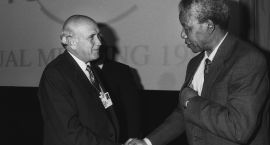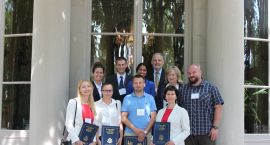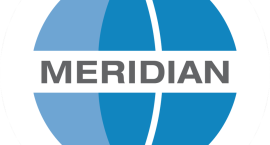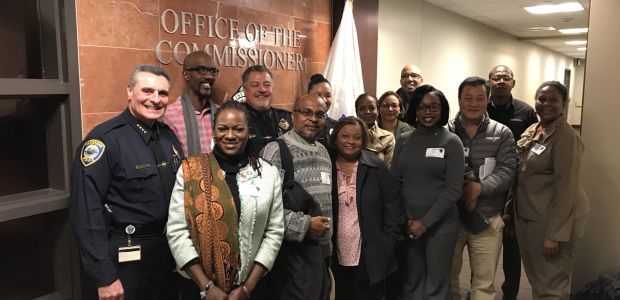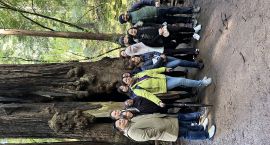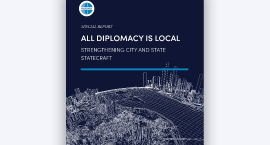Academics’ Learning Journey into CVE and Building Resilient Communities
On March 24, 2018 ten (10) academics drawn from four universities in Trinidad and Tobago embarked on a 10-day, life-changing journey to the U.S. cities of Boston, MA and Washington, DC. The trip, initiated by the U.S. Embassy in Port-of-Spain and the U.S. Department of State, was facilitated by Meridian International Center and focused on researching violent extremism and building resilient communities.
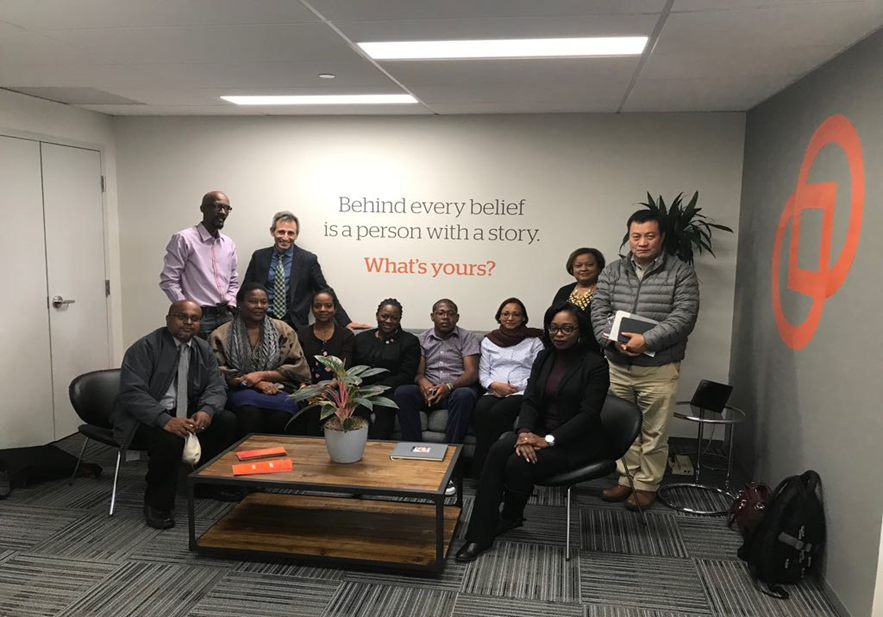
The team at Meridian International Center must be highly commended for planning and executing a programme that was well tailored to us as academics hailing from a plethora of disciplines within the realm of the Social Sciences including Sociology, Social Work, Mediation, Criminology National Security and Intelligence Studies, ICT, and Psychology. From our arrival on March 25th to our departure on April 4th, the programme was well-paced and allowed for the exploration of a range of ways to counter violent extremism by exposing us to the views and practices shared by police officers, pastors, social workers, executive directors, professors and researchers directly involved in CVE. The Boston chapter of the programme may be considered as being “grassroots;” i.e. the main aim of the meetings in Boston was for us to see policy oriented measures being put in place and executed to assist individuals and to steer them away from extremist behavior. The Washington DC chapter focused on policy and strategy from a State standpoint on CVE. Based on the idiosyncratic and laudable organization of the programme, there were seamless transitions from one meeting to another as the topics covered were very much interrelated and provided some measure of cohesion as the days progressed. This comprehensive programme allowed us to become exposed to a multi-faceted, multi-disciplinary approach to CVE which for most broadened our perspectives on the topic in that it was no longer viewed mainly as a criminological issue.
Home Hospitality and Dinner Diplomacy
Hospitality comes natural to the people of Trinidad and Tobago (Trini people). We love to laugh, eat and lime. It would be fair to say hospitality is our mother tongue. As such, one of the ingredients that made this program memorable was the intricate threading of hospitality throughout the programme. On our second night in Boston we were hosted by a wonderful couple and their room-mate. One never knows what to expect when you are invited to someone’s home for dinner and this invitation was particularly unique because our hosts were strangers to us.
Would we enjoy the meal? Would there be awkward pauses during our conversations? Even worse, would we even have anything to chat about? These and other questions no doubt occupied our thoughts as we apprehensively made our way to Jaime’s (our ‘Home Hospitality’ host) home. The experience was the exact opposite. Jaime and her flat-mates made our stay enjoyable, the food was great, the company superb.
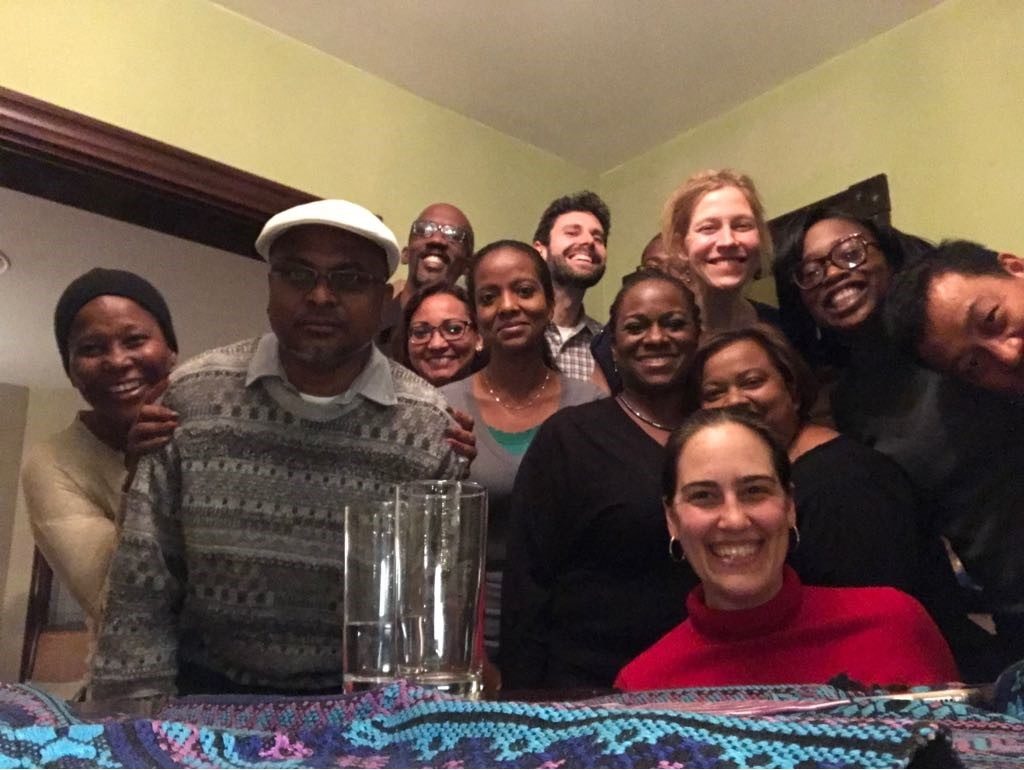
We had many laughs, chatted about a diverse range of topics and left feeling as if we had truly gained some new friends. This experience in many regards set the tone for the learning expedition that lay ahead. We continued to experience various versions of this hospitality via our facilitators, the transport personnel and even at our business appointments. Kudos to Meridian for including ‘Home Hospitality as part of the programme for without it our experience would have been, as we like to say in Trinidad and Tobago, “so-so.”
Exposure to American Culture
The program on CVE provided many professional and personal benefits to the group, however, it also afforded us the opportunity to disprove some myths about American culture. When thinking about the issue of violent extremism and countering violent extremism the TV Series “Homeland” was the image in our minds. Homeland is about CIA agents fighting terrorism – guns blazing, officers kicking down doors, interrogation suspects, and spying on citizens.
A real hard-line approach was imagined mainly based on perception developed from imagery provided by the media. This myth was quickly debunked during our journey to the U.S., as the majority of state and civil society practitioners presented an all of society approach to CVE focusing on building community and resilience. This experience revealed several things about American culture and history: multi-ethnic, welcoming/inclusive, timely and hard working. There are many different races and ethnicities wearing the label American; in Boston there are 57,000 students speaking 80 different languages.
The issue of timeliness was an important criteria for meetings – arriving on time and completing meetings on time is very important to Americans. Timeliness is driven by the culture of hard work as many American have college debts and other bills which encourages them to be focused.
This is the thrust of CVE activity in the U.S.: building communities by reducing isolation, providing social support and strengthening member relations. This preventative approach is tailor made to utilise the virtues of American culture to reduce crime, violence and to strengthen resolve.
Culture refers to the way of life of a people… the history, politics, food and fabric of society.Our visit to Boston and Washington DC and the tours to the White House, the Capitol, the Abraham Lincoln Memorial and the Vietnam War memorial left a lasting impression on our minds. The tour guide gave us great insight into the history, culture and current lifestyles of the American people.
In Boston, we saw the Oldest Police Station in the United States and took countless pictures in front of it. Just being part of ‘where it all began’ in Massachusetts helped us to connect more to the American history. Our facilitators encouraged us to visit other sites and gave us enough time to do that. This resulted in many of us visiting museums, art galleries and even the Zoo. We were happy to sample the various foods which enrich the American culture.
Experience with our Facilitators and English Language Officer
When the ‘red eye’ flight landed on Sunday 25th March, 2018, in Boston, we hurriedly disembarked from the plane then headed straight towards the baggage carousel. Before the last person could have retrieved their case, we were greeted by a warm “Hello! Welcome! Has everyone collected their suitcases?” Two of the most radiant smiles beamed upon the faces of our facilitators, Thea and Damon, and they greeted us like old friends. We never met them before, except via email, but that day we immediately felt as if we knew them and were comfortable. After quick introductions all around, we embarked on our coach to the Boston Plaza Hotel.
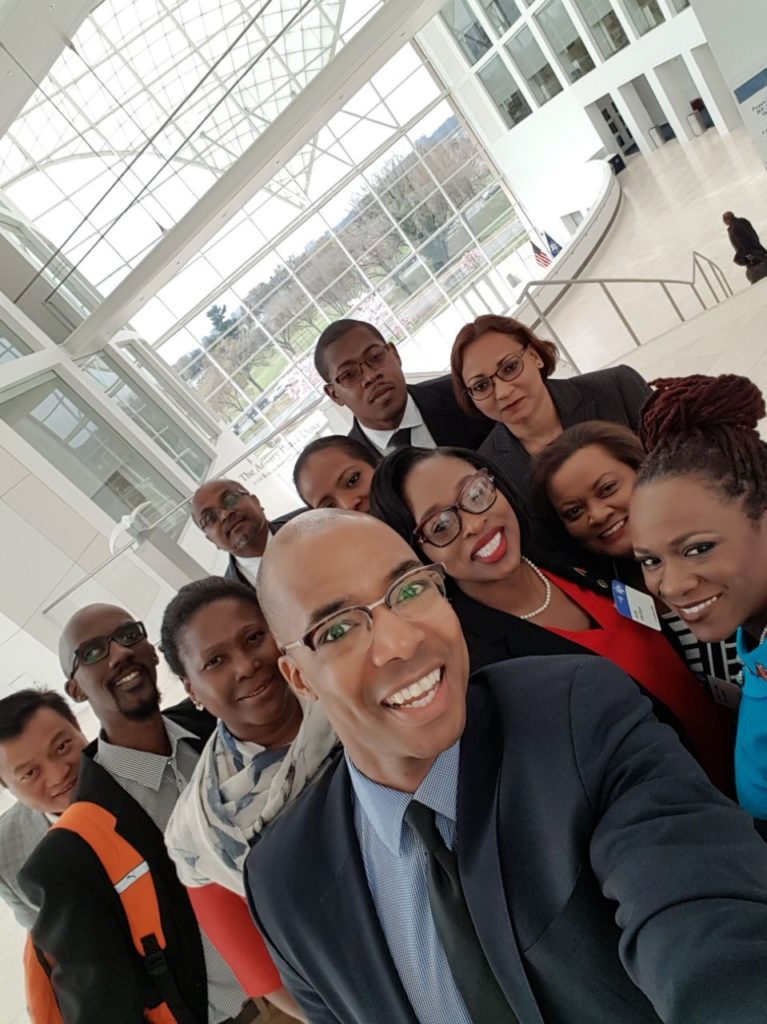
The wait in the hotel lobby was short as the Meridian team did their best to expedite our check in process taking into consideration that we had flown all night and we were dead on our legs. Cultural understanding and organization were two of the top areas for this team. As the days followed, the Meridian team demonstrated their high level organizational skills and the ability to blend the cultures of the U.S. and Trinidad and Tobago and the goal of our trip. Through the experience and expertise of the facilitators, we assimilated the role of Team Trinidad and Tobago and not ten persons from different institutions which benefited well for the smooth flow and goal of the program.
We shared many laughs, and the command and understanding of the Caribbean in its varying cultural contexts by the facilitators assisted in the solidifying of the group. The group felt respected, as each one of us are professionals in our own fields and we were treated as such. The Meridian team exceeded our exceptions. They were not only there to facilitate – they were masterful weavers of context, culture, and personality on our journey to the understanding of countering violence extremism. Meridian, we salute you!
During our program on Countering Violent Extremism, Meridian International Center demonstrated a great sense of professionalism, responsibility, integrity, friendliness, and openness. The program was highly organized and executed reflecting Meridian’s strong commitment towards promoting mutual understanding, leadership and exchange of ideas among academics with a major emphasis on building long-term professional relationships. The professionalism and experience of the facilitators contributed significantly to our overall productive and enjoyable experience.
Getting to the Heart of the Matter: Impactful Discussions
As academics, we were ultimately interested in understanding how we can direct and stimulate research in ways that can counter violent extremism. Our overarching personal objectives focused on understanding the issues related to CVE and ways that research can build resilient communities.
Meridian demonstrated a deep understanding of the needs for us as a group. The pre-assessment survey of each academic provided a useful framework which guided them in building content into the progamme in ways that met both our individual and group goals. We were particularly impressed with the selection of an array of high quality discussants as part of this study trip. We were also given sufficient time to interact with resource personnel during the visits. The meetings provided a space for us to learn of unique projects and programmes and for us to develop a broader network of professional counterparts in our individual and collective fields.
Meridian also demonstrated a fair amount of flexibility. They listened to our needs and made efforts to include an additional two appointments for us. The content of the trip showed that Meridian was both sensitive to material and well versed in the subject matter by their selection of tours, facilitators, subject matter experts and resource personnel.
The content of the study trip provided opportunities for us as a group to learn more about U.S. foreign policy, understand some key issues facing the U.S. and the ways communities react to mitigate against these problems. The impactful meetings allowed us to also understand how research can counter disinformation and to create a positive alternative narrative to violent radicalization.
Our Overall Experience
As we conclude, we must say that our overall experience was one that can be described as enriching, empowering and educational. All the meetings were purpose-driven and arranged strategically. Each meeting was seamlessly coordinated with sufficient time for breaks. While it was a packed ten days, we transitioned well into each appointment. We were even graciously hosted by the Ambassador in Washington DC. Travel arrangement to and from meetings in both Boston and Washington DC were timely, efficient, and the drivers were very professional. Meridian chose well when it came to the meetings we needed to attend, people we needed to see, times for each meeting as well as their duration. The transport services chosen for both Boston and Washington DC were meticulously done. Even the hotels seemed to be chosen with precision, as we were provided with easy access to transportation, comfortable amenities, professional services, warmth, and above all, services which kept us connected to our families and work back home, such as the fast and reliable internet and business services.
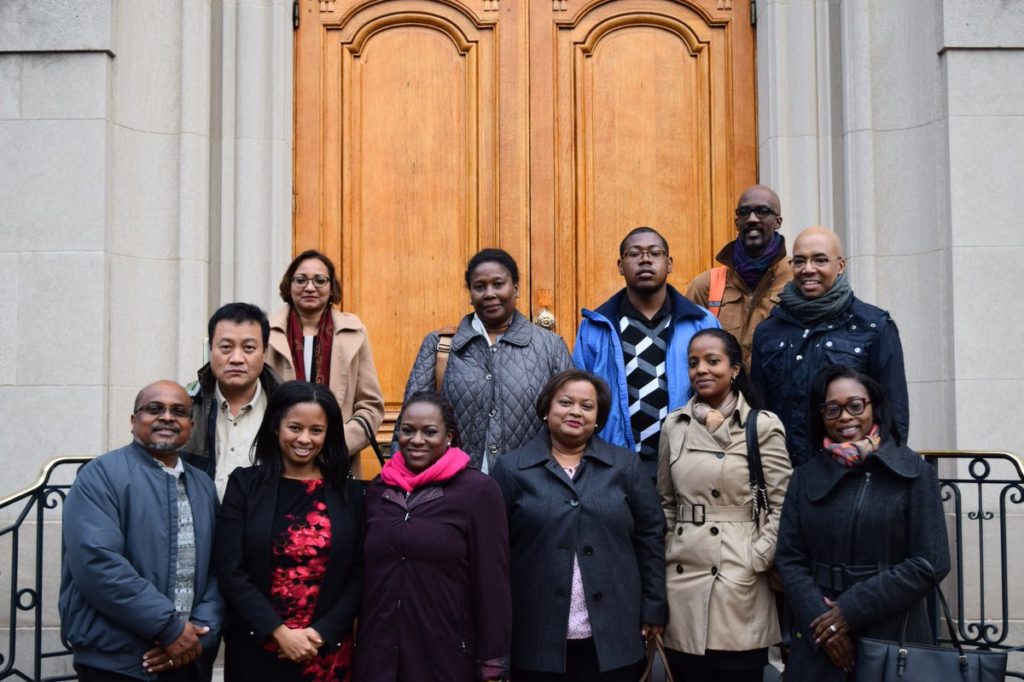
Special mention must be made to the hard work of Mr. Damon Woods, who was chosen by Meridian to accompany the group to our meetings. As professionals ourselves we understood how challenging that process can be to manage, especially with a group of ten people. Mr. Woods to his credit managed the group with such remarkable efficiency. He managed transitions between meetings well, alerted us to our schedules, and provided cultural briefs before meetings and tours. He was also adept at researching facts and sending us links to other programmes mentioned during our visits. Mr. Woods made our meetings easy, stress-free, and enjoyable. There is so much more that can be said but unfortunately time does not permit. The group unanimously agreed that without the approach of both Meridian and Mr. Woods, the experience of this group would have been widely different. We as a group thank both Thea and her team and Damon for their outstanding efforts in making this occasion an auspicious and edifying one for all of us. And we especially thank the Public Affairs Section of the U.S. Embassy in Port-of-Spain and the U.S. Department of State for the investment in us!
This article was written by participants of the program.









